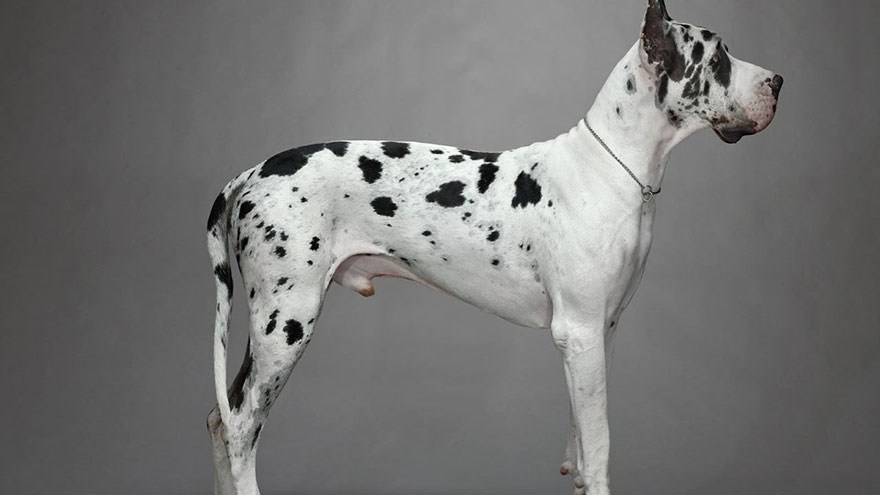Great Dane : 10 Most Common Questions
The Great Dane is a unique dog because of its incredible size. However, do not let this fool you if considering this breed. After all, the Great Dane is also a very gentle and loving breed.
With the proper breeding and basic obedience training, the Great Dane makes a wonderful family pet.
This breed is loyal to the owner and naturally protective of family members. To help in understanding this gentle giant, we have gathered ten common questions and provided answers for each.
Great Dane : 10 FAQ

1. Where did this huge breed come from?
The Great Dane actually has no real connection to Denmark. It is an ancient breed, showing up in records thousands of years ago. Germany, Greece, parts of Spain, and Italy are realistic places when searching for the roots of the Great Dane. The breed is the result of crossing mastiff-type dogs with Irish Greyhounds.
2. Is this large dog good for a family pet?
In most cases, the Great Dane makes a wonderful family pet. It is a naturally gentle breed and does quite well with children. With this and all breeds, you always want to buy a puppy from a good breeder, one that has provided puppies with a healthy and loving start.
The best Great Dane for a family pet should have basic obedience training, making it comfortable around people from the beginning.
3. How big does the Great Dane get?
The Great Dane stands up to three feet tall at the shoulder (females are slightly shorter). In addition, male Great Danes often weigh 150 to 175 pounds, with the female weighing a few pounds less, up to 130 or 140 pounds.
4. Is the Great Dane a good inside dog or a better outside dog?
The Great Dane is an inside dog that does very well in a home. However, remember, this is a large breed so it needs adequate room. In addition, this breed needs daily exercise to stretch its legs and work off some energy.
Remember, you should never leave your pet tied or chained outside. Additionally, the Great Dane should not be left alone and unsupervised for long periods, due to boredom potential.
5. Should I be concerned with poorly bred Great Danes?
The popularity of unusual dogs, such as the giant Great Dane, has led to some indiscriminate breeding by individuals just wanting to make money from selling.
You should only work with a top-quality, reputable breeder who spends the time and money to make sure the puppies and breeding stock are the best around. A good breeder would be open to questions, as well as asking you questions.
6. Is the Great Dane difficult to groom?
The Great Dane does not need extensive grooming. Typically, regular brushing and combing of the short coat should be sufficient, along with an occasional dry shampoo. By providing this breed with regular grooming, you would only need to experience bath time about once a month.
7. What is the best way to potty train my Great Dane?
For most dogs, we recommend crate training, which provides the dog a safe haven. In addition, the crate serves as a den, something in which the dog would naturally want to keep clean. Just make sure to take the dog out early in the morning and again in the evening.
Of course, your Great Dane should be outside for exercise as much as possible. As with any dog and potty training, be patient, loving, firm, and never harsh.
8. Do Great Danes get along well with other dogs?
This breed does well with other dogs, but a good start in socialization as a puppy is necessary. Some individual Great Danes are aggressive toward other dogs, especially those of the same sex. However, a breeder who has taken time to socialize the puppies with other dogs means a much better chance of having an adult Great Dane that does great with animals too.
9. How long does the Great Dane live?
Like many very large dogs, the Great Dane does not live an exceptionally long life. With proper diet, regular exercise, and scheduled visits to the veterinarian, you would expect this dog to live 10 to 12 years.
10. What health problems should I watch for in my Great Dane?
They can be prone to hip dysplasia, but you should clear this question with your breeder before you purchase your puppy. Large dogs can be affected by bloat or stomach distortion, a condition that sometimes stems from eating large amounts of food too fast.
Feeding the Great Dane multiple times during the day may be a good idea. Watch for heart problems as well with this large breed.
Read More About Great Dane
- Great Dane Breed Information
- Great Dane Training Guide
- Great Dane Health Guide
- Owning a Great Dane : Breeder Recommendations

